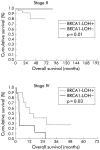Prognostic significance of the allelic loss of the BRCA1 gene in colorectal cancer
- PMID: 14633957
- PMCID: PMC1773878
- DOI: 10.1136/gut.52.12.1756
Prognostic significance of the allelic loss of the BRCA1 gene in colorectal cancer
Abstract
Background: Survival at the intermediate stage of colorectal cancer (CRC) is less predictable than in the early and advanced stages. Several genetic markers possibly involved in growth and progression of CRC can be used for prognosis.
Aims: This study investigated the proportion of allelic loss (loss of heterozygosity (LOH)) at the BRCA1 locus in sporadic CRC and its value in patient prognosis.
Patients and methods: A total of 314 patients were investigated for LOH at the BRCA1 locus using polymerase chain reaction by means of three intragenic polymorphic microsatellite markers. Allelic losses were compared with clinicopathological characteristics of patients, recurrence rate, disease free survival (DFS), and overall survival.
Results: Twenty six patients were excluded because of microsatellite instability. Of the remaining 288 cases, 244 (84.7%) were informative, with 97 (39.8%) patients bearing BRCA1 LOH. Recurrence rate was higher in patients with LOH (p=0.0003), and DFS was 73.3% (SEM 5.7) at five years in patients without LOH, and 49.2% (7.1) in cases with positive allelic loss (p=0.0004). Retention of alleles at the BRCA1 locus was associated with a favourable DFS in stages I and II (p<0.05). The presence of LOH was also significantly associated with short overall survival (p=0.02). Multivariate analysis in the complete series showed that stage (p=0.006) and lymph node metastases (> or =4 nodes, p=0.0001; 1-3 nodes, p=0.038) were independent prognostic factors. However, multivariate study by stages revealed that BRCA1 LOH was an independent prognostic factor in stages I and II (p=0.001).
Conclusions: BRCA1 LOH is a molecular alteration present in CRC, with unfavourable repercussions for overall survival, that could be considered as an outstanding independent prognostic factor in stages I and II.
Figures





Similar articles
-
Allelic loss on chromosome 18q as a prognostic marker in stage II colorectal cancer.Gastroenterology. 1998 Jun;114(6):1180-7. doi: 10.1016/s0016-5085(98)70423-8. Gastroenterology. 1998. PMID: 9609754
-
Loss of heterozygosity at 3p23 is correlated with poor survival in patients with colorectal carcinoma.Cancer. 2000 Sep 15;89(6):1220-7. doi: 10.1002/1097-0142(20000915)89:6<1220::aid-cncr5>3.0.co;2-z. Cancer. 2000. PMID: 11002216
-
Microsatellite Alterations With Allelic Loss at 9p24.2 Signify Less-Aggressive Colorectal Cancer Metastasis.Gastroenterology. 2016 Apr;150(4):944-55. doi: 10.1053/j.gastro.2015.12.032. Epub 2016 Jan 2. Gastroenterology. 2016. PMID: 26752111 Free PMC article.
-
Mapping of genetic deletions on chromosome 3 in colorectal cancer: loss of 3p25-pter is associated with distant metastasis and poor survival.Ann Surg Oncol. 2011 Sep;18(9):2662-70. doi: 10.1245/s10434-011-1603-9. Epub 2011 Feb 23. Ann Surg Oncol. 2011. PMID: 21347784
-
Allelic loss of a common microsatellite marker MYCL1: a useful prognostic factor of poor outcomes in colorectal cancer.Clin Cancer Res. 2004 Mar 1;10(5):1758-63. doi: 10.1158/1078-0432.ccr-0779-3. Clin Cancer Res. 2004. PMID: 15014029
Cited by
-
Mutated DNA Damage Repair Pathways Are Prognostic and Chemosensitivity Markers for Resected Colorectal Cancer Liver Metastases.Front Oncol. 2021 Mar 31;11:643375. doi: 10.3389/fonc.2021.643375. eCollection 2021. Front Oncol. 2021. PMID: 33869034 Free PMC article.
-
Prognostic significance of tumor genotypes and CD8+ infiltrates in stage I-III colorectal cancer.Oncotarget. 2018 Nov 2;9(86):35623-35638. doi: 10.18632/oncotarget.26256. eCollection 2018 Nov 2. Oncotarget. 2018. PMID: 30479693 Free PMC article.
-
Establishment of a Colorectal Cancer-Related MicroRNA-mRNA Regulatory Network by Microarray and Bioinformatics.Front Genet. 2020 Oct 23;11:560186. doi: 10.3389/fgene.2020.560186. eCollection 2020. Front Genet. 2020. PMID: 33193642 Free PMC article.
-
Genetic instability in the RAD51 and BRCA1 regions in breast cancer.Cell Mol Biol Lett. 2007;12(2):192-205. doi: 10.2478/s11658-006-0063-x. Epub 2006 Dec 18. Cell Mol Biol Lett. 2007. PMID: 17180310 Free PMC article.
-
The role of ALDH2 in tumorigenesis and tumor progression: Targeting ALDH2 as a potential cancer treatment.Acta Pharm Sin B. 2021 Jun;11(6):1400-1411. doi: 10.1016/j.apsb.2021.02.008. Epub 2021 Feb 11. Acta Pharm Sin B. 2021. PMID: 34221859 Free PMC article. Review.
References
-
- Cohen AM, Minsky BD, Schilsky RL. Cancer of the colon. In: Devita VT jr, Hellman S, Rosemberg SA, eds. Cancer principles and practice of oncology. Philadelphia: Lippincott-Raven, 1997:1144–97.
-
- Deans GT, Parks TG, Rowlands BJ, et al. Prognostic factors in colorectal cancer. Br J Surg 1992;79:608–13. - PubMed
-
- Silverberg E, Boring CE, Squires TS. Cancer statistics. CA Cancer J Clin 1990;40:9–26. - PubMed
-
- Vogelstein B, Fearon ER, Hamilton SR, et al. Genetics alterations during colorectal-tumor development. N Engl J Med 1988;319:525–32. - PubMed
-
- Delattre O, Olschwang S, Law DJ, et al. Multiple genetics alterations in distal and proximal colorectal cancer. Lancet 1989;12:353–6. - PubMed
MeSH terms
Substances
LinkOut - more resources
Full Text Sources
Medical
Miscellaneous
